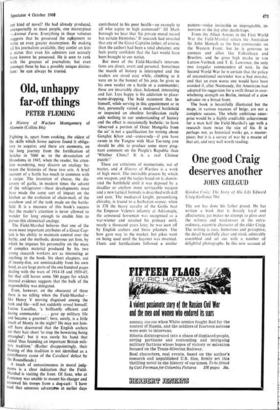One good Craig deserves another
JOHN GIELGUD
The son has done his father proud. He has written a book that is fiercely loyal and affectionate, yet makes no attempt to gloss over the wiliness and weaknesses in the extra- ordinary, eccentric character of the elder Craig. The writing is easy, humorous and perceptive, the detail beautifully clear and vivid, admirably assembled and set out with a number of delightful photographs. In this new account of
his life and achievements the son fills many important gaps in his father's own writings, both about himself and about his theories of the theatre.
Most of his dreams—after a few brilliant but commercially unsuccessful productions in London when he was a very young man—were, so we see clearly from this account, too idealised, too sweeping, too difficult to execute, for the artist to let them out of his hands to be entrusted to inadequate realisation. Besides, everyone thought him wildly impractical and, though he could be the jolliest of companions, he was always a difficult and exacting perfec- tionist where his work was concerned. Con- sequently, though his ideas were to influence an entire generation, and though he was admired and encouraged by most of the cleverest people of his time (Shaw—despite his quarrels with Craig over the Shaw-Terry correspondence— Max Beerbohm, Herbert Tree, Max Rein- hardt, Count Kessler, Poulsen, Stanislaysky and, last but by no means least, Isadore Duncan), Gordon Craig achieved only six or seven actual stage productions in his long life, leaving instead (luckily for posterity) a mass of schemes and sketches, woodcuts, bookplates, his biographies of Irving and his mother and his own theatre books, fascinating, though often irritatingly evasive.
Never idle, industrious, gregarious and well- informed, this book describes him with unerring shrewdness—the obsession with his own illegitimacy, his persecution mania, his princely indifference in money matters; his romantic, indefatigable promiscuousness with women, and the childish dismay with which he always seemed to greet the news of another baby on the way; his grit and perseverance in continual exile from his own country; the way he clung always to the fascinating legends he had created for himself—partly to compensate for his own disappointment as an actor—yet with all his revolutionary ideas, remained ever infinitely, nostalgically loyal to the memories of Irving and Ellen Terry and his golden boyhood in the park at Hampton Court and on the stage of the Lyceum.
A genius born before his time. One may surely apply this old cliché to the per- sonality and career of Gordon Craig, for the theatre which he envisaged and longed to be able to create—untainted by the horrors of vulgar interference and ignorant commer- cialism—was surely that very theatre which Peter Brook conceives today (and which he has to some extent achieved already). A theatre of sound and mood and light, of music, masks, movement, dance and pantomime, with a flexible, imaginative text interpreted by a trained group of actors, singers, dancers, clowns, acrobats and athletes, all ordered and set in motion by a single controlling hand.
Only to think that Craig would have shuddered at the thought of audience-participa- tion, and still more certainly at Brook's theory of disturbing the spectators, mentally and even physically, during a performance. Craig would not have liked the congregation dancing upon the altar, though he loved the old music-hall songs, and no doubt enjoyed joining in the choruses which he was often fond of trolling out even when I knew him as a very old man. He was ninety-four when he died, still lively and opinionated, and I think he would have been very pleased with his son's book. It is a notable tribute to a supremely fascinating per- sonality, paid with infinite sincerity and devotion.







































 Previous page
Previous page